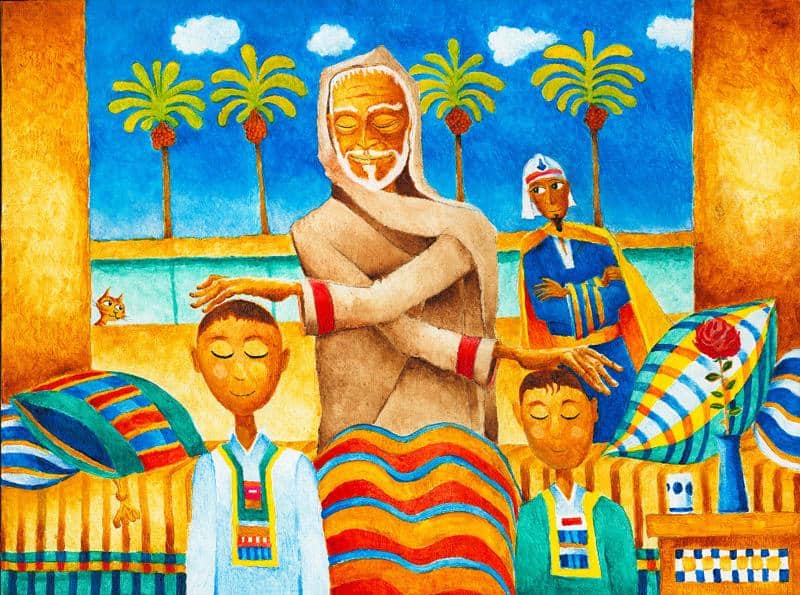Bonjour / Hello [nickname_else_first_name],
Table of contents
1) Perashat Hashavoua - Rabbi Eli Mansour
2) Halakhat Hashavoua (Halakhot related to day to day life) By Hazzan David Azerad - Laws of Tefilah
3) Holy Jokes!
1)PERASHAT HASHAVOUA
This Week's Parasha Insight with Rabbi Eli Mansour
Parashat Vayehi- Yaakob’s Blessing to His Grandchildren
************
Join our BIG iTorah.com campaign!
Announcing the NEW APP from iTorah.com
https://itorah.com/campaigns/special
************
The Torah in Parashat Vayehi tells of the special blessing which Yaakob Abinu conferred upon Yosef’s two sons, Efrayim and Menashe. Upon hearing that Yaakob was gravely ill, Yosef brought his sons to see Yaakob, and Yaakob gave them a special blessing.
Rav Yaakob Kamenetsky (1891-1986) raises the question of why Yaakob would give Yosef’s sons a special blessing – seemingly repeating the mistake he had made many years earlier, showing preferential treatment to Yosef. It was because of his favoritism toward Yosef, making him a special garment, that Yosef’s brothers despised him, ultimately scheming to kill him, and then selling him as a slave. How is it possible that Yaakob would now make the same mistake, showing favoritism to Yosef by singling out his children over all his other grandchildren, and granting them a special blessing which he did not give the others?
Rav Kamenetsky answers this question by distinguishing between what we might term a blessing out of necessity, and a blessing out of luxury.
If a person happens to receive a private audience with a great Rabbi, and receives the Rabbi’s blessing for prosperity and success, others who hear about his blessing will, understandably, feel envious. But now let’s imagine the unfortunate situation of somebody who, Heaven forbid, is experiencing a dire crisis – such as a gravely ill family member, or severe financial hardships – and travels to meet with a great Rabbi to receive his blessing. Quite obviously, nobody will envy this individual, who, in his state of crisis, desperately needed a blessing.
Rav Kamenetsky posits that Yaakob had no qualms about blessing Yosef’s sons because the blessing he gave them was a necessity, not a luxury. They were born and raised in Egypt, in a foreign country, among a foreign society, without having built a connection with their grandparents back in Eretz Yisrael. Their cousins, meanwhile, were born and raised in Eretz Yisrael, with regular exposure to Yaakob. This is why Yaakob granted Efrayim and Menashe a special blessing – because they desperately needed a blessing for protection from the corrupt, pagan influence of Egyptian society, that they would remain loyal to the values and legacy of Abraham, Yishak and Yaakob, despite having been born and raised in Egypt, far from their righteous forebears.
Next week, we will begin the reading of the Book of Shemot, which opens with the words, "Ve’eleh Shemot Beneh Yisrael Ha’ba’im Misrayema" – "And these are the names of the sons of Yisrael, who came to Egypt." Surprisingly, the Torah here uses the word "Ha’ba’im" – which literally means, "who are coming," in the present tense. The Torah alludes to us that when Jews are in exile, no matter how many years they live in any given place, they are still "coming," as though they have just arrived. We never fully get settled anywhere besides our homeland, Eretz Yisrael. When we live in exile, we must remain cognizant of our status as outsiders, and keenly sense that we do not truly belong, that we are the descendants of Abraham, Yishak and Yaakob and the bearers of their legacy, who happen to find ourselves in exile only temporarily.
It is by maintaining this connection to our homeland and to our roots that we successfully resist the pressure to assimilate the abandon our tradition, and we remain steadfastly committed to our ancient spiritual legacy so we will be worthy of returning to Eretz Yisrael and seeing the rebuilt Bet Ha’mikdash, speedily and in our times, Amen.
2) HALAKHAT HASHAVOUA
Halachot this week are selected and Translated by Hazzan David Azerad
Laws of Tefila , according to the rulings of Maran Rabbi Obadiah Yosef ZT”L
One may not pray in front of a mirror, even if he closes his eyes, because he appears to be bowing to himself.Also not standing in front of a window at night and you can see your reflection, it's good to cover the window with a curtain.
Why is it important to pray in a fixed or regular place?
Our Sages said in the Talmud (Berakhot 6:8): Whoever determines a place for his prayer, the God of Abraham helps him.
Therefore, each person should try to determine a place for his prayer, and should pray in the same synagogue as well as in a fixed place in the Synagogue , and in this he wins that his prayer is more acceptable. Even when praying at home one should have a fixed place set aside for Tefila
.
What direction should one pray when he is not sure of the direction to Yerushalayim?
When praying outside of Israel one should be facing the Land of Israel. When in the Land of Israel,one should be facing in the direction of Yerushalayim. In Yerushalayim, one should be facing in the direction of Beit Hamikdash.He who does not know the directions, will pray to whichever side he wants, and direct his heart to his Father in heaven.
Bevirkat Shabbat Shalom Umevorach
David Azerad
3) HOLY JoKeS!!
Selection of funny snippets, loosely related to this weeks parashah or current events, to brighten your day














